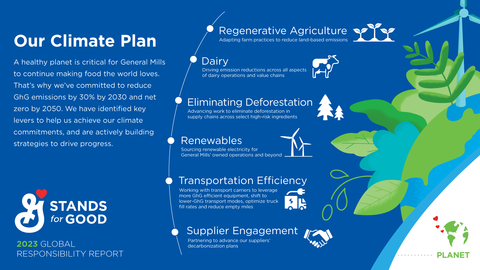General Mills Stands for Good in 2023 Global Responsibility Report
General Mills (NYSE: GIS) has released its annual Global Responsibility Report, showcasing progress made from June 1, 2021, to May 31, 2022, in three critical areas: Planet, People, and Food. The company is committed to reducing greenhouse gas emissions by 30% by 2030 and achieving net-zero emissions by 2050. This year, General Mills reduced emissions from its owned operations by 49%, exceeding its 2030 targets. In terms of diversity, the company has increased representation of people of color in officer positions to 29% and maintained female representation at 50%. Additionally, General Mills is the largest producer of natural and organic packaged food in the U.S., with 40% of its global volume meeting Nutrition-Forward criteria. The report emphasizes the company's commitment to sustainability and social responsibility.
- Achieved a 49% reduction in greenhouse gas emissions from owned operations since 2020.
- Plans to reduce greenhouse gas emissions by 30% by 2030 and achieve net-zero emissions by 2050.
- Increased representation of people of color in officer positions to 29%.
- Maintained female representation at 50% for the last three years.
- Continued leadership as the largest producer of natural and organic packaged food in the U.S..
- None.
Company advances new climate plan; shares progress against diversity, inclusion and belonging commitments; and maintains its leadership as the largest producer of natural and organic packaged food in the

A healthy planet is critical for
“For more than 150 years,
Standing for Planet
While only five percent of General Mills’ GhG footprint comes from its owned operations, the company is driving significant reductions here. Since 2020, the company has reduced GhG emissions from its owned operations by 49 percent, including a 26 percent reduction in fiscal 2022. With this progress, the company has met and exceeded its 2030 Scope 1 and Scope 2 Science Based Target goals.
Collective action and collaboration across its value chain are critical to addressing the company’s Scope 3 emissions. To successfully advance decarbonization strategies,
“A healthy planet is critical for
Additional progress against Planet commitments in fiscal 2022 includes:
- Advancing regenerative agriculture: Adoption of regenerative techniques on more than 120,700 new acres of farmland, for a total of 235,700 acres;
- Transitioning to renewable electricity: Successfully sourced 87 percent renewable electricity across its global owned operations;
- Designing recyclable and reusable packaging: Ninety-two percent of packaging for its North America Retail and North America Foodservice operating segments was recyclable or reusable (by weight); and
- Achieving zero waste to landfill status: Six additional global production facilities achieved zero waste to landfill status, totaling 17 (41 percent) of General Mills’ owned facilities.
Standing for People
Supporting its employees and strengthening hometown communities are two of General Mills’ greatest priorities. In fiscal 2022, the company continued its journey to create a safe, inclusive, and rewarding workplace. One important step is expanding its
“A diverse workforce is important for our business and central to our core value of championing belonging,” said
Progress against People commitments in fiscal 2022 includes:
-
Improving racial equity: Increased representation of people of color in officer positions to 29 percent and professional roles to 21 percent for the first time ever. People of color also represent 33 percent of its Board of Directors and 24 percent of its total
U.S. employee population. - Advancing female representation: To date, maintained global representation at 50 percent women consistently over the last three years, at and above the professional level.
-
Investing in diverse suppliers: Increased spending with diverse suppliers by 40 percent, creating 3,535 jobs and contributing nearly
$500 million
The company’s commitment to Standing for People extends beyond its operations and into its hometown communities, which
-
Strengthening communities: The company contributed
$90 million $3 million -
Supporting equity-focused charitable giving: Eighty percent of all
Twin Cities non-profits funded in 2022 are organizations primarily focused on improving the lives of Black, Indigenous and/or people of color. -
Alleviating hunger: Through donations of
General Mills food, the company enabled 29 million meals worldwide.
Food the World Loves
-
Expanding natural and organic products: The company maintained its leadership as the largest producer of natural and organic packaged food in the
U.S. , and one in nine products within the company’s North American portfolio is certified organic or made with organic ingredients. -
Making nutrition-forward foods: Forty percent of General Mills’ global volume met Nutrition-Forward criteria.
General Mills continues to invest in nutrition research through collaboration with scientists, universities, and consortiums, as well as its ownBell Institute of Health and Nutrition , which is the company’s source for scientific health and nutrition expertise. - Meeting consumer needs: Through our venture capital arm, 301 INC, the company continues to invest in new products and brands that align with evolving consumer preferences, including plant-based brands such as Everything Legendary and No Cow.
To learn more about General Mills’ progress, visit GeneralMills.com/howwemakeit.
G STANDS FOR GOOD
ABOUT
View source version on businesswire.com: https://www.businesswire.com/news/home/20230418005384/en/
Communications
Media.Line@GenMills.com
763-764-6364
Source:
FAQ
What are General Mills' greenhouse gas reduction targets?
How much did General Mills reduce emissions in fiscal 2022?
What percentage of General Mills' workforce is female?
What is General Mills' commitment to diversity?







